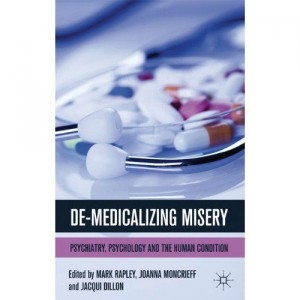De-Medicalizing Misery, edited by Mark Rapley, Joanna Moncrieff, and Jacqui Dillon
This book is a collection of papers by various authors, most of whom have experience working with clients and are also associated with prestigious British universities.
Here are some quotes:
“The architects of modern biological psychiatry have constructed a system that does little justice to the myriad problems it claims to address, while creating multiple iatrogenic problems for those to whom it is applied.” (p 1)
“It is no wonder that psychiatry is so fearful of context and has to devise so many strategies to avoid it, because context constantly threatens to make emotional and behavourial problems intelligible or, to put it another way, it threatens to abolish psychiatry’s self-defined subject matter.” (p 36-37)
“By copying the medical approach of defining problems as “illness,” psychiatry and the mental illnesses it constructed achieved a sort of prestige of being ‘real’ in a biological sense although there is little to justify this.” (p 47)
“When you are not fully in control of your life – when, for example, you could be sacked from your poorly paid job at any moment – in a very real sense others are in control of your life and it may feel as if they are persecuting you.” (p 59)
“When we use the notion of paranoia to diagnose others we may obscure the real causes of their distress, locating it instead in faulty brain mechanisms, rather than out there in a frequently hostile world.” (p 64)
“Over the last 20 years, many millions of people around the world have been persuaded that their difficulties arise from a brain disorder that can be called ‘depression’ and corrected by drug treatment. The ideas of ‘depression’ and ‘antidepressants’ have been marketed, as ‘diseases’, to a general audience as never before. Few people are aware that these concepts have their origins, not in robust scientific research, but rather in the interests of a psychiatric profession desperate to cement its professional position, and in the marketing tactics of the pharmaceutical industry. Antidepressants have transformed a myriad of social and personal problems into a source of corporate profit and professional prestige.” (p 188)
This is a very important book. I strongly recommend it. Buy it; read it; recommend it to a friend and to your local library.
Note: Just for the record, I have no financial stake in this or any book I have recommended. My only concern is to spread the word: modern psychiatry is based on a spurious philosophy and is damaging and destructive.
